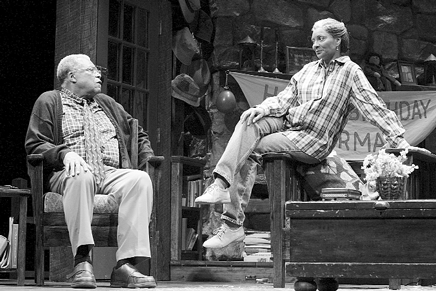James Earl Jones disappoints, Leslie Uggams surprisingly sticks around
There’s a very good reason that the Thayers’ summerhouse is infested with flies, and it’s not just that it’s Maine in the summer where the fly is jokingly referred to as the state bird. The new production of Ernest Thompson’s “On Golden Pond” drips with so much cloying sweetness that it’s a miracle that the Cort Theatre isn’t overrun with ants as well. Of course, once you realize that the sugar is really an artificial sweetener, the inherent falseness of this entire undertaking becomes as clear as the titular pond.
Thompson’s story about the quintessential WASP family that discovers its ability to have and––gasp!––express emotions has never seemed more shallow and facile. The characters are all stereotypes—the crotchety withholding father, the selfish and self-involved daughter who needs to be seen as an adult and the loving mom who tries to bridge the gap between them—and the story is a model of banality. It’s easy to forget that, given that Hepburn and Fonda won Oscars for the 1981 all-star movie version of the play and the original 1978 Broadway production with Frances Sternhagen and Tom Aldredge is an idealized myth among theater cognoscenti.
At the end of the day, this is bland theater for the sitcom-saturated, with its superficial emotionalism and manipulated story, and your hazy memory should not delude you that this play is anything but a stinker, pure and simple.
What has made this play such a warm memory has been star power in the leading roles in the past that overshadowed the ineptness of the play. No such luck on this outing. James Earl Jones plays Norman Thayer, Jr., the curmudgeon. Well, let’s not go too far. Rather than playing the part, he intones it. Jones’ Norman is nothing more than an excessively annoying crank whose wife has indulged his snarky behavior and, given this license, has aged into a nasty, abusive man. It is a half-hearted performance devoid of any emotional truth, obviously designed to trade on the appeal of Jones’ persona rather than any effort to embody the, admittedly feeble, role.
As far as his relationship with his daughter, Chelsea, Jones was a more believable parent in “Star Wars.” In fact, he makes no tangible connection with any other actor on the stage at any time. Perhaps we are meant to believe that it is Norman’s “tragedy” that he cannot connect and is trapped in a selfish prison of his own making. But it gets pretty darn dull when it’s expressed only through self-reverential posing.
It’s also hard to believe that an Ethel as vibrant and hardworking as Leslie Uggams would have stuck around for all of this abuse. Of the cast, only Uggams ever seems present in the moment, but it’s painful to watch her work so hard to connect only to hit a brick wall time after time. In the final scene when Norman doesn’t die of a heart attack, it would make more sense if she stood and did nothing, avenged and free at last. But that’s Aeschylus not Thompson. So Uggams rallies and provides the perfect portrait of a woman in an abusive relationship living in denial. We almost believe Ethel is happy.
The rest of the cast is competent. Linda Powell delivers Chelsea’s lines as written, but never really lets us feel the depth of her pain and disillusionment at not having a relationship with her father. Craig Brockhorn as the mailman Charlie disposes of the stock and silly part with as much dignity as possible. Alexander Mitchell as Bill Ray, the man who wants to marry Chelsea, does well with little. And it’s to the credit of Peter Francis James that his Billy, the boy who spends the summer with the elder Thayers, almost comes across as a real person. The part is cloying and self-conscious, but James is easy on stage and is the only actor who seems to get a spark of life out of Jones.
gaycitynews.com


































